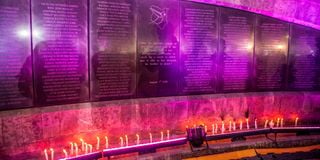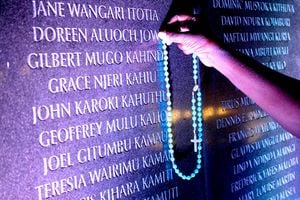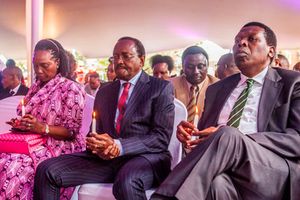
Candles are lit during the 25th commemoration of the 1998 bomb blast at the Bomb Blast Memorial Park in Nairobi on August 7, 2023.
In July 2023 High Court judge David Majanja ordered Mary Ngunyi Muiriri to refund $65,683 (Sh8.4 million) she erroneously received from a US agency, just one breadcrumb in a long trail of litigation sparked by the 1998 terror attacks in Nairobi and Dar-es-Salaam.
Following the twin bombings, numerous cases have been filed in the US and Kenya, all involving compensation of victims.
There is a second batch of court cases currently before the US courts, filed by MM-Law, in which Dr Ngunyi is among the plaintiffs.
While she is a former US Embassy employee and victim of the 1998 attack, Dr Ngunyi’s case is still before court and the settlement fund argued that before judgment is entered, she cannot claim to be a beneficiary of someone else’s package.
The 1998 United States Embassy Bombing Qualified Settlement Fund intended to send the funds to Mary Njoki Muiriri in October 2020 when it mistakenly credited Dr Ngunyi’s account instead.
Court papers show that Ms Muiruri was one of several plaintiffs in a case filed in 2008 by America’s MM-Law on behalf of bombing victims. A US court ruled in favour of the plaintiffs.
The settlement fund was formed to remit funds to the successful plaintiffs or their families. When it realised that money had been sent to the wrong person, the settlement fund sent a recall letter to DTB.
Reversing the transaction
However, Kenyan laws required the lender to seek Dr Ngunyi’s consent before reversing the transaction.
Dr Ngunyi declined to give her consent to reverse the transaction, insisting that she was a victim of the US Embassy bombing in Nairobi who was to be compensated.
The settlement fund sued Dr Ngunyi and DTB at the Milimani High Court in January, 2021 following the standoff.
Dr Ngunyi entered appearance in the matter but never filed a response to the suit years later, and the settlement fund opted to pursue a summary judgment.
DTB in its court papers said it has no horse in the race, and that the lender’s hands were tied by the fact that Dr Ngunyi refused to give consent for reversal of the funds.
The settlement fund wanted both Dr Ngunyi and DTB held liable for the funds.
In his determination, Justice Majanja agreed that the lack of any filing by Dr Ngunyi warranted a summary judgment.
The judge, however, agreed with DTB’s argument that the lender was only stuck on account of Dr Ngunyi’s refusal to consent to the reversal.
In the end, the judge ordered that Dr Ngunyi refund the Sh8.4 million with interest at court rates (12 per cent) from the date the suit was filed until payment in full.
Read: Senators push for 1998 blast compensation amid claims majority of victims will not get anything
In 2008, MM-Law filed three cases on behalf of numerous victims, against Sudan and Iran which were deemed to have offered financial, material and intelligence support to Al Qaeda specifically for the Nairobi and Dar-es-Salaam attacks. The lead victims were identified in the court documents as, Wamai, Onsongo and Amduso.
Judge John Bates in 2011 ruled in favour of the plaintiffs. Two years later, the judge allowed MM-Law to add another case, under a lead plaintiff identified as Opati.
In 2014 the Opati case also succeeded, bringing the total win for plaintiffs to $8.6 billion (Sh1.1 trillion). The award included compensatory damages with interest and punitive damages.
Sudan challenged all the judgments in 2015 by filing an application to vacate the decisions. Judge Bates declined, and Sudan moved to the Court of Appeal.
The Court of Appeal in 2017 held that Sudan was liable for the compensation, but ruled that laws allowing for the application of punitive damages in such instances were only enacted in 2008 – a decade after the attacks.
MM-Law moved to the Supreme Court, which in 2020 ruled that allowing Sudan to escape either limb of the Sh1.1 trillion award would be harmful to US national security.
In the end, the award was upheld at Sh1.1 trillion.
MM-Law is before the US District Court in Columbia, after filing another case against Iran. The lead plaintiff is Joseph Kazunga Katana, and Dr Ngunyi is one of the plaintiffs.
Last Tuesday, two days to the 26th anniversary of the tragedy, the US government filed a notice of potential participation in the Katana case.
This means the US government may file documents in support of the plaintiffs and send officials to testify against Iran, as it did in the earlier batch of cases that yielded Sh1.1 trillion.
There have been dozens of cases filed against Iran and Sudan in US courts, with billions of dollars being awarded to the plaintiffs since 2001.
In Kenya, a group of spouses and children of some victims of the attack in Nairobi unsuccessfully sued the Kenyan government for failure to stop the attacks.
The group of 17 filed a constitutional petition at the Milimani High Court in 2019, with their main claim being that the government failed to act on intelligence to quell the terror attack.
The Interior Ministry in its response argued that the intelligence received was too broad, as it entailed heightened terror activities in the East African region and did not have enough specifics.
Justice Anthony Mrima dismissed the petition in March 2022 after holding that there was not enough evidence to show that the government failed to act on credible intelligence to stop the attacks.












